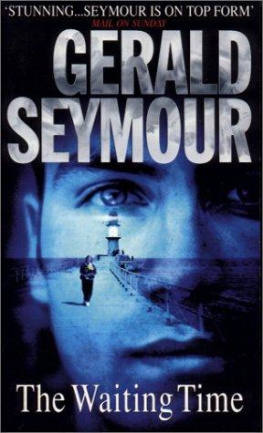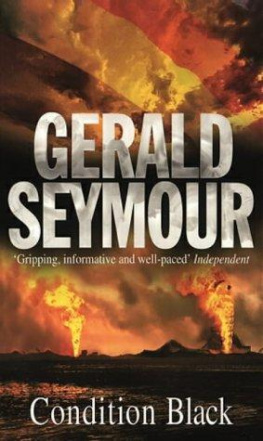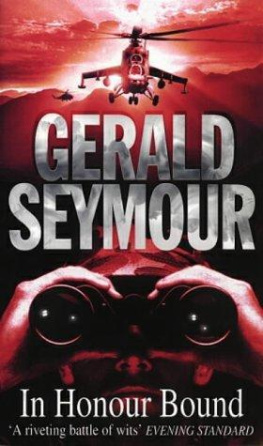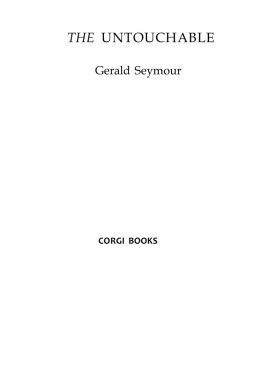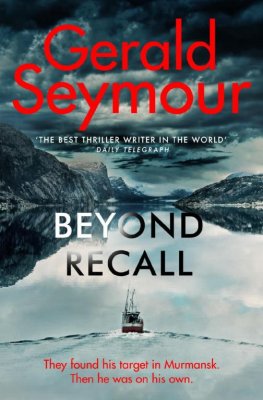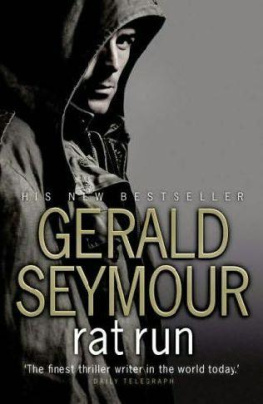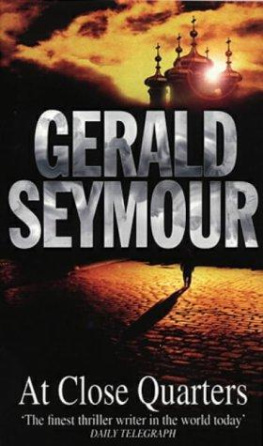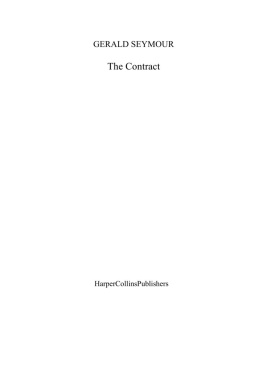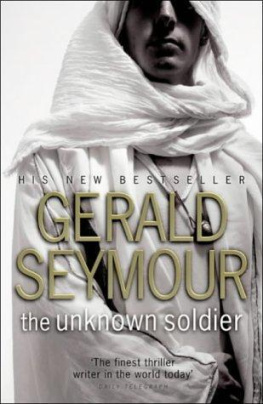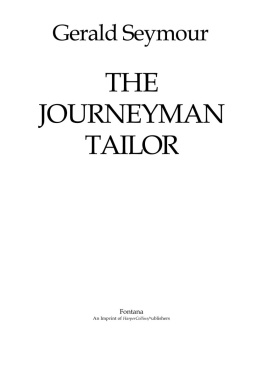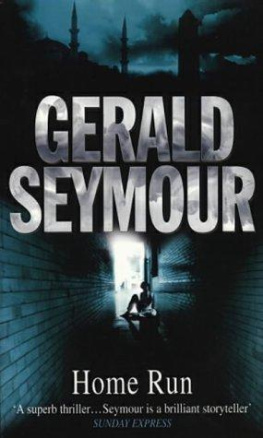Gerald Seymour - The Dealer and the Dead
Here you can read online Gerald Seymour - The Dealer and the Dead full text of the book (entire story) in english for free. Download pdf and epub, get meaning, cover and reviews about this ebook. year: 2010, publisher: Hodder & Stoughton, genre: Detective and thriller. Description of the work, (preface) as well as reviews are available. Best literature library LitArk.com created for fans of good reading and offers a wide selection of genres:
Romance novel
Science fiction
Adventure
Detective
Science
History
Home and family
Prose
Art
Politics
Computer
Non-fiction
Religion
Business
Children
Humor
Choose a favorite category and find really read worthwhile books. Enjoy immersion in the world of imagination, feel the emotions of the characters or learn something new for yourself, make an fascinating discovery.

- Book:The Dealer and the Dead
- Author:
- Publisher:Hodder & Stoughton
- Genre:
- Year:2010
- Rating:4 / 5
- Favourites:Add to favourites
- Your mark:
- 80
- 1
- 2
- 3
- 4
- 5
The Dealer and the Dead: summary, description and annotation
We offer to read an annotation, description, summary or preface (depends on what the author of the book "The Dealer and the Dead" wrote himself). If you haven't found the necessary information about the book — write in the comments, we will try to find it.
The Dealer and the Dead — read online for free the complete book (whole text) full work
Below is the text of the book, divided by pages. System saving the place of the last page read, allows you to conveniently read the book "The Dealer and the Dead" online for free, without having to search again every time where you left off. Put a bookmark, and you can go to the page where you finished reading at any time.
Font size:
Interval:
Bookmark:
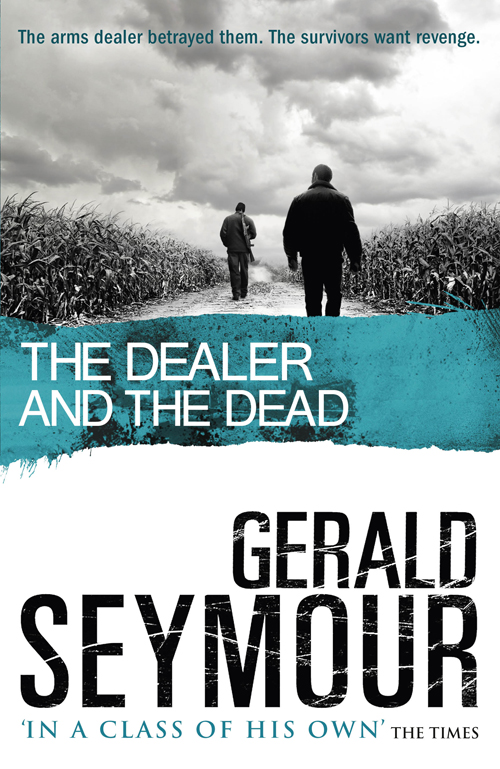
First published in Great Britain in 2010 by Hodder & Stoughton
An Hachette UK Company
Copyright Gerald Seymour 2010
The right of Gerald Seymour to be identified as the Author of the Work has been asserted by him in accordance with the Copyright, Designs and Patents Act 1988.
All rights reserved. No part of this publication may be reproduced, stored in a retrieval system, or transmitted, in any form or by any means without the prior written permission of the publisher, nor be otherwise circulated in any form of binding or cover other than that in which it is published and without a similar condition being imposed on the subsequent purchaser.
All characters in this publication are fictitious and any resemblance to real persons, living or dead, is purely coincidental.
A CIP catalogue record for this title is available from the British Library
Epub ISBN 978-1-848-94731-3
Book ISBN 978-0-340-91890-6
Hodder & Stoughton Ltd
338 Euston Road
London NW1 3BH
www.hodder.co.uk
For James and Becky
GERALD SEYMOUR
The Dealer
and the Dead

www.hodder.co.uk
They were right, and he knew it but he could not admit it to them.
Petars boy had started, had nagged at it, then Tomislavs son had taken it up, and now it was Andrijas cousin who voiced the obvious. We are here too long, sir We should have been well gone Sir, we have to accept it. It is in our faces and an idiot could see it.
The respect they showed him waned with each minute they stayed huddled and bent low, trying to find some minimal shelter from the rain. The corn, which had ripened two months before and had not, of course, been harvested, offered no refuge from the cold and wet that engulfed them. They respected him because he had taught them basic lessons at the villages school, adding and subtracting, writing and reading, with a degree of discipline. He sensed that their respect had almost run its course but he would not admit to them that they were right and he was wrong.
We stay, he said. They will come. They promised they would. I have their word.
As the schoolteacher in the village, Zoran was a person of status. If there had been a resident priest, the teacher would have had second place, but they shared a priest with other small communities. If the land around their village had been administered and worked by a collective, Zoran would have lagged behind its manager, but the strip fields had escaped the centralisation of the old regime and were farmed by individuals. They waited on a path between Petars crops, near to the Vuka river.
Zoran was wrong because now he could see the men who challenged his authority not clearly, in detail, but he recognised their shapes and shadow movements. He knew which was Petars son, and Tomislavs, and which was Andrijas cousin. He could see them because the dawn was coming slowly because of the deluge of rain. They should not be on the path after first light. They called it the Kukuruzni Put, and knew it was an act of suicide to be moving on the Cornfield Road without the cover of darkness.
But he demanded that they wait.
If anyone stood at full height and peered to the west, through the drooping tips of the corn, they would have seen the constant light over the town that was, perhaps, five kilometres down the Cornfield Road. The brightness was from the many fires that the incendiary shells had lit. If they stayed crouched, with their faces a few centimetres from the mud, and cupped their self-rolled cigarettes in their palms, they still could not escape the rumble of the big howitzer guns. The explosions intensifying because a new day always started with a barrage of destruction were muffled if the firing came from across the Danube and aimed at the heart of the town, loud if the targets were the villages of Marinci and Bogdanovci, and shatteringly clear if the shells came down on their own homes. When the closest shells detonated, each man shuddered or winced. Zoran thought of his wife, and the young men of their fathers, Petar and Tomislav; Andrijas cousin thought of Maria and Andrija, in their cellar.
For almost three months the Cornfield Road had been the lifeline for the town and three villages that straddled it. The men and women who defended them accepted that when this last route was cut the siege would end and resistance would collapse. Zoran could have berated them for smoking, for allowing the smell of burned tobacco to waft in the wind, but did not.
It was hard for him to believe they would not come. He strained his eyes to search for the tiny torch beam that would show his trust had been well placed. He tried to shut out the murmurs of the men with him and listen for the squelch of boots among the collapsed corn. He saw nothing but the vivid brightness of the fires in the town and heard only the complaints of those he had brought with him.
Listen, old man, are you wanting us all dead? They arent coming. They would have been here by now if they were.
Twenty-four days ago he had walked fast down that path. Then the Cetniks the Yugoslav military and Arkans scum had been further back. Now they were closer and had snipers with night-vision gear who watched the gaps where the crop had failed. Artillery and mortars were used at random, and it was only possible to cross the fields at night.
Wait a little longer. They promised theyd come. He gave me his word.
Twenty-four days earlier, clutching a weighted briefcase, Zoran had negotiated the path through the corn and travelled with the hope and sacrifice of the village stuffed into the frayed leather case that had once held classroom notes and textbooks. Telephone lines were long cut, and the enemy listened routinely to the Motorola radios. He had left the village and gone through the lines and into the comparative safety of Vinkovci, then had taken a taxi to the embryo capital of his country. In Zagreb, a city of bright streetlights, restaurants serving hot food, and bars where beer was drunk, he had met a nephew who worked in the fledgling Ministry of Defence. He had been told it was inconceivable that an arms shipment would be sent for his village alone and not the town on the bend of the great river.
Then his nephew had sat forward, eyes darting from side to side, checking they would not be overheard, and had murmured that reinforcements and resources would be directed to the front line nearer to the city; the price of a ceasefire on all sectors was the fall of the town and their part of eastern Slavonia. His nephew had slipped a piece of folded paper into his hand, saying that Zoran was in his prayers.
When his nephew had gone Zoran saw a kind of normality around him, but the people in the caf had no comprehension of the lives of their fellow countrymen beyond Vinkovci, in the town and the villages. He opened the paper, to find a name and a telephone number with an international code. He had gone to the telephone booth, by the door to the toilets, and dialled. His call was answered.
He had lingered in the city for two days, unable to learn anything about the siege on the Danube. He had hated the place, had felt a stranger among his own. The bombardment of Dubrovnik had attracted international headlines but not the struggle for his village, the others and the town. He believed his nephew from the Ministry of Defence: they had been abandoned.
He had met a man. He had placed an order, spelled it out, and had half expected a croak of derision. The answer: No problem.
Bolder, he had said when the order must be delivered and to where. The response: No problem.
Font size:
Interval:
Bookmark:
Similar books «The Dealer and the Dead»
Look at similar books to The Dealer and the Dead. We have selected literature similar in name and meaning in the hope of providing readers with more options to find new, interesting, not yet read works.
Discussion, reviews of the book The Dealer and the Dead and just readers' own opinions. Leave your comments, write what you think about the work, its meaning or the main characters. Specify what exactly you liked and what you didn't like, and why you think so.

